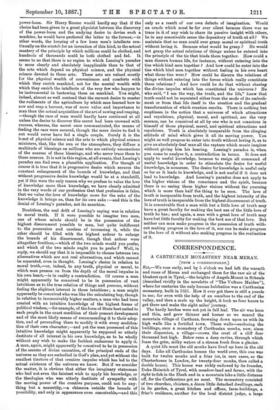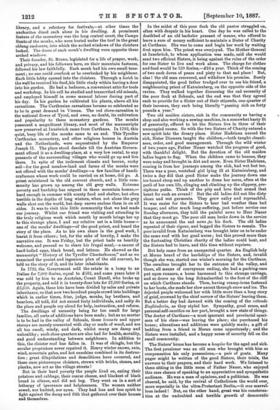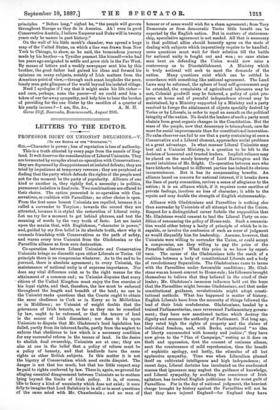CORRESPONDENCE.
A CARTHUSIAN MONASTERY NEAR MERAN. [mom A CORRESPONDENT.] SIR,—We rose early, and by Li o'clock we had left the warmth and roses of Moran and exchanged them for the raw air of the bleakest spot in Tyrol,—the heights of Angels Mount in Schnell; (described vividly in the novelette of "The Vulture Maiden"), where for centuries the only human habitation was a Carthusian monastery, built in 1325. How it ever got there is still a puzzle to me; for even with the help of an omnibus to the end of the valley, and then a male up the height, it took us four hours to get there and make the eight miles' journey.
The hardy larches were not yet in full leaf. The air was keen and thin, and grew thinner and keener as we neared the mountain village of Carthaus, frowning down upon us with its high walls like a fortified town. These walls—enclosing the buildings, once a monastery of Carthusian monks, now, since their dispersion, a village—crown the crest of a cliff four thousand feet high. Below runs a deep ravine, through which foam the grim, milky waters of a stream fresh from a glacier.
A quiet life moat the old monks have lived up here in the old days. Like all Carthusian houses the world over, this one was built for twelve monks and a friar (or, in rare cases, as the Charterhonse in London, for twenty-four monks, then called a double house). This house was richly endowed by its founder, Duke Heinrich of Tyrol, with meadow-land and farms, with the right to fish in the Etseh and in a mountain lake a little distance off, for the Carthusians got no meat. The monastery consisted of two churches, cloisters, a dozen little detached dwellings, each in its garden, a great kitchen and offices, farm-buildings, a friar's residence, another for the local district judge, a large library, and a refectory for festivals,—at other times the anohorites dined each alone in his dwelling. A prominent feature of the monastery was the long central court, the Campo Santo of the monks, who were buried under the turf in the great oblong enclosure, into which the arched windows of the cloisters looked. The doors of each monk's dwelling were opposite these arched windows.
Their founder, St. Bruno, legislated for a life of prayer, work, and privacy, and his followers here, on their mountain fastness, followed his law faithfully. Each monk bad his own small tene- ment; no one could overlook or be overlooked by his neighbour. Each little lobby opened into the cloisters. Through a hatch in the wall he received his food,his little study within having a door into his garden. He had a bedroom, a convenient attic, for tools and workshop. In his cell he studied and transcribed old missals, and employed himself in some manual labour during part of his day. In his garden he cultivated his plants, above all his carnations. The Carthusian carnations became so celebrated as to be in great demand in Vienna. The red clove-carnation is the national flower of Tyrol, and owes, no doubt, its cultivation and popularity to these monastery gardens. The monks possessed a magnificent library, and most of the manuscripts now preserved at Inuebriick came from Carthaus. In 1782, this -quiet, busy life of the monks came to an end. This Tyroller Carthusian monastery, and other religious houses in Austria and the Netherlands, were sequestrated by the Emperor Joseph II. The place stood desolate till the Austrian Govern- ment offered it as a dwelling-place, at a very low rental, to any peasants of the surrounding villages who would go up and live there. In spite of the inclement climate and barren, rocky soil—for the good meadow-land and farms of the monks were not offered with the monks' dwellings—a few families of handi- craftsmen whose work could be carried on at home, did go. A priest ministered in the old convent church, and a little com- munity has grown up among the old grey walls. Extreme poverty and hardship has reigned in these mountain homes,— hard enough in summer with scanty food and shelter, but often terrible in the depths of long winters, when not alone the grey walls shot out the world, but deep snows enclose them in on all sides. It was to visit this little community that we had made our journey. Whilst our friend was visiting and attending to the truly religious work which month by month brings her up to this strange place. I and my relative sat in a little house— one of the monks' dwellings—of the good priest, and heard the story of the place. As to his own share in the good work, I learnt it from others ; but, for the sake of brevity, I make the narrative one. It was Friday, but the priest bade us heartily welcome, and pressed us to share his frugal meal,—a saucer of hard-boiled eggs, black bread, and lettuce. He showed us the manuscript " History of the Tyroller Charterhouse," and as we examined the quaint and ingenious plan of the old convent, he told us the story of it, and its later inhabitants.
In 3782, the Government sold the estate in a lump to an Italian for 7,000 florins, equal to R582, and some years later it was sold by him to an Austrian, Count Handl, who broke up the property, and sold it in twenty-four lots for 27,000 florins, or 22,250. Again, these lots have been divided by sales and private inheritance, so that now two hundred people crowd into buildings which in earlier times, friar, judge, monks, lay brothers, and boarders, all told, did not exceed forty individuals, and sadly do the place and people cry aloud for help, instruction, and reform.
The dwellings of necessity being far too small for large families, all sorts of additions have been made; but as no mortar is to be had in the valley of Schnals, these leans-to and upper storeys are merely connected with clay or made of wood, and are all too small, windy, and dark, whilst many are damp and unhealthy ; such close quarters are also bad for health, morality, and good understanding between neighbours. In addition to this, the cloister roof has fallen in. It was of shingle, but the secular proprietors never repaired it. Heavy winter snows, rain, wind, mountain gales, and hot sunshine combined in its destruc- tion; great dilapidations and demolitions have occurred, and these once picturesque cloisters, strewn with bricks, stones, and planks, now act as the village streets !
But in their hard poverty the people lived on, eating their potatoes and cabbage, their coarse cheese, and blackest of black bread in silence, and did not beg. They went on in a sort of lethargy of ignorance and helplessness. The women neither sewed, nor knitted, nor spun. They had less and less spirit to fight against the decay and filth that gathered over their houses and themselves. In the midst of this poor flock the old pastor struggled on, often with despair in his heart. One day be was called to the deathbed of an old bachelor peasant of means, who offered to leave a sum of money sufficient to maintain a Sister of Charity at Carthans. She was to come and begin her work by waiting first upon him. The priest was overjoyed. The Mother-General at Innsbruck, to whom application was made, said she would send two efficient Sisters, it being against the rules of the order for one Sister to live and work alone. The charge for clothes and food would be 120 florins,-210 a year. Think of the coming of two such doves of peace and piety to that sad place ! But, alas ! the old man recovered, and withdrew his promise. Sorely disappointed, the good father trudged over to see his friend, a neighbouring priest of Katmienberg, on the opposite side of the ravine. They walked together discussing the sad necessity of the poor flock at Schnals, and the end was that they agreed each to provide for a Sister out of their stipends, one-quarter of their incomes, they each being literally "passing rich on forty pounds a year."
Two old maiden sisters, rich in the community as having a shop and also working a sewing-machine, in a somewhat hasty fit of generosity, offered to let the Sisters live in three of their unoccupied rooms. So with the two Sisters of Charity entered a new spirit into the dreary place. Sister Hadriana nursed the sick, Sister Diomera taught the children,—both taught cleanli- ness, order, and good management. Through the wild winter of two years ago, Father Naner watched the progress of good, with thankful delight. But the devotion of the old maiden ladies began to flag. When the children came to lessons, they were noisy and brought in dirt and snow. Even Sister Hadriana, coming in from her journeys among the sick, had wet feet too. There was a poor, wretched girl lying ill at Katmienberg, and twice a day did that good Sister make the journey down one ice-bound steep and up another to dress her sores, often at the peril of her own life, clinging and climbing up the slippery, pre- cipitous paths. Think of the pity and love that armed that heart for such an errand! But the old ladies did not like dirty shoes and wet garments. They grew sulky and reproachful. It was easier for the Sisters to bear bad weather than bad temper, and after much long-suffering, just before service one Sunday afternoon, they told the painful news to Herr Hauer that they must go. The poor old man broke down in the service as he announced the sad news ,to his flock. The old ladies repented of their rigour, and begged the Sisters to remain. The poor invalid from Batmienberg was brought later on to be under the same roof with her good nurse ; but this proved more than the fluctuating Christian charity of the ladies could bear, and the Sisters had to leave, and this time without reprieve.
But help came from an unexpected quarter. An English lady at Meran heard of the hardships of the Sisters, and, invalid though she was, started one winter's morning for the Carthans. The omnibus brought her to the entrance of the valley, and there, all means of conveyance ending, she had a packing-case put upon runners, a horse harnessed to this strange carriage, and so drove up the long Schnalserthal to the foot of the cliff on which Carthans stands. Then, having cramp-irons fastened to her boots, she made her slow ascent through snow and ice. The dejected people welcomed her with little more than a long story of grief, crowned by the chief sorrow of the Sisters' leaving them. Bat a better day had dawned with the coming of the rettende Englanderin, as they styled her. Sympathy, good sense, and personal self-sacrifice on her part, brought a new state of things. The doctor of Carthans—a most ignorant and provincial speci- men of his class—was leaving the place; she purchased his house; alterations and additions were quickly made; a gift of bedding from a friend in Moran came opportunely ; and the Sisters were installed, and a happy sense of security fell on the small community.
The Sisters' house has become a hospice for the aged and sick. The first pensioner was an old man who brought with him as compensation his only possessions,—a pair of goats. Many pages might be written of the good Sisters, their trials, the answers to their prayers, and their hard work. We listened to these sitting in the little room of Father Naner, who enjoyed this rare chance of speaking to an appreciative and sympathetic audience. He was a man of opinions, and a politician. He was cheered, he said, by the revival of Catholicism the world over more especially in the ultra-Protestant Berlin,—it was marvel-
, lous indeed ! But, on the other hand, great was his consterna- tion at the undoubted and terrible growth of democratic principles. " Before long," sighed he, " the people will govern throughout Europe as they do in America. Ah ! even in good Conservative Austria, I believe Emperor and Doke will in twenty years only be names in past history."
On the wall of his little monk's chamber, was spread a huge map of the United States, on which a line was drawn from New York to Chicago, to show, as he said, the tremendous journey made by his brother—a Tyroller peasant like himself—who had ten years ago emigrated to settle and grow rich in the Far West. By means of letters and a weekly newspaper sent him by this brother, the good father had gained his ideas and formed his opinions on many subjects, notably of Irish matters from the American point of view,—through such scant loopholes the poor, lonely man gets glimpses of the world beyond his isolated village.
Need I apologise if I say that it might make his life richer— and ours, perhaps, none the poorer—if we could send him a token of our far-away sympathy, and help him to bear the burden of providing for the one Sister by the sacrifice of a quarter of




































 Previous page
Previous page